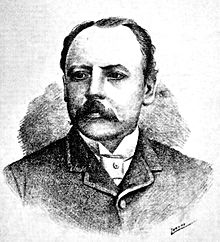Michael P. Grace
| Michael Paul Grace | |
|---|---|
 |
|
| Born | 1842 Queenstown, County Cork, Ireland |
| Died | September 20, 1920 London, England |
| Cause of death | Heart attack |
| Resting place | Battle Abbey Churchyard |
| Residence | Belgravia, London, England, Battle Abbey, Battle, East Sussex, England, Westbury, New York, United States |
| Occupation | Businessman |
| Known for | Founding co-benefactor of Grace Institute |
| Board member of | W. R. Grace and Company, Grace Brothers & Co., Grace National Bank |
| Spouse(s) | Margaret Mason |
| Children | Elisa Mercedes, Elaina Maria, Margarita Celia, Gladys S. |
| Parent(s) | James Grace & Ellen Russell |
| Relatives | Siblings: William Russell, John William, Morgan Stanislaus |
Michael Paul Grace (1842 – September 20, 1920) was an Irish-American businessman who was a shareholder and Chairman of the Board of Directors of W. R. Grace and Company shipping company of New York City and of Grace Brothers & Co. Ltd. of London, England.
Born in Queenstown, County Cork, Ireland. to a wealthy family, as a young man he went to Peru where his father had business interests and where he joined his brother William who had formed a partnership with John Bryce to operate as ship chandlers. William Grace would emigrate to the United States in 1865 where he established W. R. Grace & Co. of New York, while Michael Grace remained in Peru developing government contacts for the business that became Grace Brothers & Co.
Michael Grace expanded the business into new fields including a near monopoly in the business of supplying the construction contractors building Peru's railway system with rail track iron and timber for rail ties plus foodstuffs and other provisions. The Grace brothers' influence with the Peruvian government saw them obtain the most of the contracts to provide munitions and battle ships during the Peru-Chile War of the Pacific between 1877 and 1884. When the war ended, Michael Grace traveled to England and in 1887 put together a consortium of lenders to provide the funding necessary to stabilize the cash-strapped government of Peru. [1]
Michael Grace too emigrated to the United States where he would become an American citizen. The Grace brothers, along with Michael Grace's English son-in-law, Richard Hely-Hutchinson, 6th Earl of Donoughmore, widened their business in Peru to include control of the guano deposits along the Pacific coast, vast tracts of land containing both oil and mineral deposits including silver mines at Cerro de Pasco that were reported by the New York Times in its June 22, 1885 edition as "probably the richest and most extensive in the world." In conjunction with the Cerro de Pasco mines, the Grace's acquired a ninety-nine year lease, the first seven of which were free, on the financially troubled Oroya Railroad originally built in early 1870s by American promoter Henry Meiggs but not fully completed. In that same June 22, 1885 story, the New York Times concluded that "Mr. Grace [Michael P.] gets a property which cost $27,600,900—86 miles of railroad already equipped and in operation, 50 miles of the most expensive tunneling and grading in the world—for nothing provided he will complete the line." [2]
...
Wikipedia
